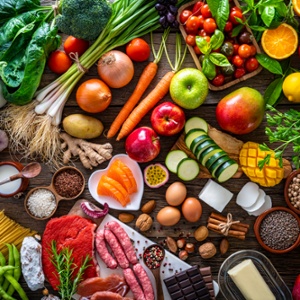Over time, our plates have grown bigger and so have our portions. From supermarket shelves to restaurant tables, larger servings have quietly become the norm. The result? Many of us are eating more than our bodies need, often without realising it.
But here’s the good news: small regular changes to your plate could make a big change to your weight. Reducing portion sizes is one of the simplest, most effective steps you can take to achieve and maintain a healthy weight.
Why does portion size matter?
When we eat more than we need, our bodies store the extra energy as fat. Over time, this can make it harder to manage our weight. But by making small, sustainable changes, like serving smaller portions, you can take back control without giving up the foods you love.
If portion sizes are something you struggle with, there are some things you can do to help.
- Use smaller plates and glasses – It’s a proven way to help you eat less and still feel satisfied.
- Serve what you need… save what you don’t – Do yourself a favour and save a portion for another day. Not only will it save you time and money, but it will also help you avoid overeating.
- Choose lighter options when eating out – Where possible try to go for regular instead of large portions.
- Check food labels – Recommended portion sizes are often smaller than you think.
- Fill up on fibre – Add more fruit, veg, pulses, and wholegrains to feel fuller for longer.
- Swap energy-dense foods – Try lighter sauces, leaner proteins, and healthier cooking methods such as oven-baked and air-fried instead of deep or shallow fried.
- Stay hydrated – Drinking plenty of fluids, such as still or sparkling water and sugar-free drinks, can help you feel satisfied.
Finding the right balance
A healthy plate isn’t just about size, it’s about balance. Aim for more fruit, vegetables, and fibre-rich foods, and fewer high-fat, high-sugar options. These swaps can help you feel satisfied, stay energised, and support long-term health.
- Fibre helps you feel full – Foods like beans, lentils, wholegrains, and vegetables not only keep you satisfied but also support digestion.
- Tinned foods count too – baked beans (reduced sugar/salt), chickpeas, kidney beans, tinned vegetables (with no added salt) and tinned fruit in natural juice are affordable, easy ways to boost fibre.
- Frozen can be fresh too – Frozen fruit and veg are picked and frozen quickly to lock in flavour and nutrients. They last longer, often cost less, and make it easy to upgrade your home-cooked meals with convenient and healthy ingredients.
- Simple swaps make a big difference – Switch creamy sauces for tomato-based ones, swap fried foods for grilled, and choose leaner proteins like pulses, fish, chicken, turkey, or 5% fat beef mince.
- Energy-dense foods add up fast – Items like full fat mayonnaise, fried foods, sugary drinks, biscuits and processed meats are high in calories but low in nutrients. Reducing these can help you manage your weight without cutting out flavour.
Need some more inspiration? The NHS Eatwell Guide is a great place to start.
Ready to Make a Change?
Join the quarter of a million people across Wales who are taking control, one portion at a time with the Healthy Weight Healthy You website. Small changes today, can shape your future health.
For more information and to access your free resources complete Find Your Journey now.






